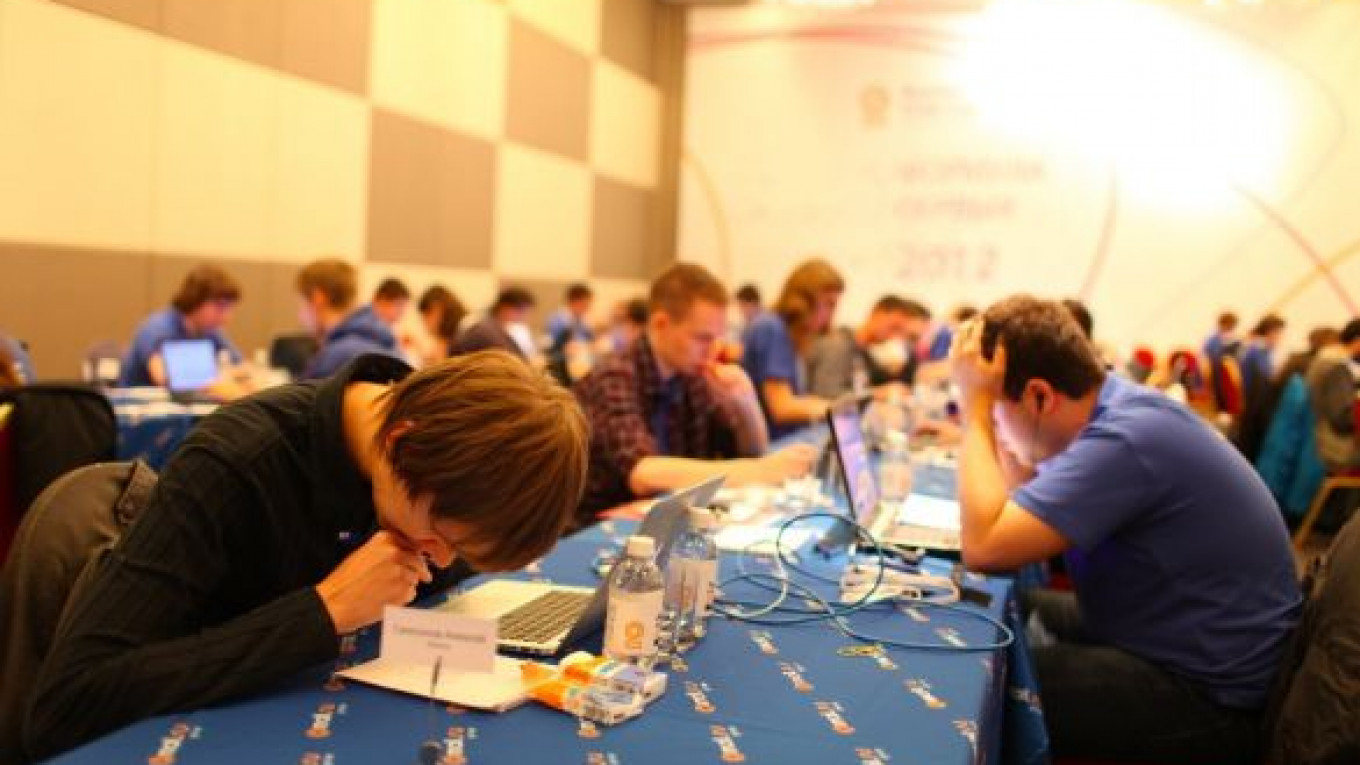Just as Moscow's weather started to improve, 47 young men and three women locked themselves into a small room Monday and sat staring intently at their computer screens.
A $18,000 prize was on the line, but the financial reward was not all that the participants of the second annual Russian Code Cup thought about. They also knew that potential employers were shuffling just outside the door, waiting to see who would emerge as one of the best Russian-speaking programmers in the world.
"The money is less important than the recognition you get for winning such a competition," said industry veteran Gleb Leonov, who came to compete from St. Petersburg. He added that many of the people in the room had already been approached with job offers.
The interest in these young programmers was not surprising given the continuing staff shortages that exist in Russia's information-technology sector. Government officials were also watching the competition closely in the hopes that computer-savvy youngsters like these would eventually help to diversify the country's economy.
"We want there to be additional points for regional growth so that the progress of our country does not always narrow down to Moscow and St. Petersburg," said Communications and Press Minister Nikolai Nikiforov, adding that other regions have great potential to provide quality IT specialists.
The participants of Russian Code Cup 2012, which is organized by Mail.Ru Group, already had strong regional representation. The winner, Vladislav Epifanov, was from Nizhny Novgorod, while second place went to Natalya Bondarenko from Saratov and Yaroslavl-born Yegor Kulikov took third.
Nikiforov wants the number of IT specialists to grow, especially in regions outside Moscow.
There are now about 400,000 people working in the sector in Russia, and another 800,000 are indirectly connected to the sector, he said. The government hopes to cultivate at least 400,000 more IT specialists by 2018.
One deputy minister at the Communications and Press Ministry has recently been assigned to look specifically at IT issues to promote this task.
But the heads of educational institutions say that few new students come into the field while many are still choosing to leave Russia for better offers abroad. The brain drain is less serious than it was in the 1990s, but it is still an issue for the IT sector, said Mail.Ru chief executive Dmitry Grishin.
Tellingly, though the participants of the Russian Code Cup were all Russian speakers, they came from 23 different countries. Some were walking around with a hint of a California tan and in sweatshirts with Stanford and Facebook logos.
The key to retaining specialists in Russia will be to give them the quality of work and working environment that matches world levels, Grishin said. He said that it is sometimes more financially advantageous for programmers to work in Moscow due to lower taxes, so it is possible to convince them to stay here.
But Nikiforov said that good working conditions will not be enough to keep people in the country.
"The young people who are growing up now and are getting their education here must sincerely and objectively, with all their heart and soul, want to live and work only in Russia. That is impossible to achieve unless the quality of life is good," he said.
Related articles:
A Message from The Moscow Times:
Dear readers,
We are facing unprecedented challenges. Russia's Prosecutor General's Office has designated The Moscow Times as an "undesirable" organization, criminalizing our work and putting our staff at risk of prosecution. This follows our earlier unjust labeling as a "foreign agent."
These actions are direct attempts to silence independent journalism in Russia. The authorities claim our work "discredits the decisions of the Russian leadership." We see things differently: we strive to provide accurate, unbiased reporting on Russia.
We, the journalists of The Moscow Times, refuse to be silenced. But to continue our work, we need your help.
Your support, no matter how small, makes a world of difference. If you can, please support us monthly starting from just $2. It's quick to set up, and every contribution makes a significant impact.
By supporting The Moscow Times, you're defending open, independent journalism in the face of repression. Thank you for standing with us.
Remind me later.






